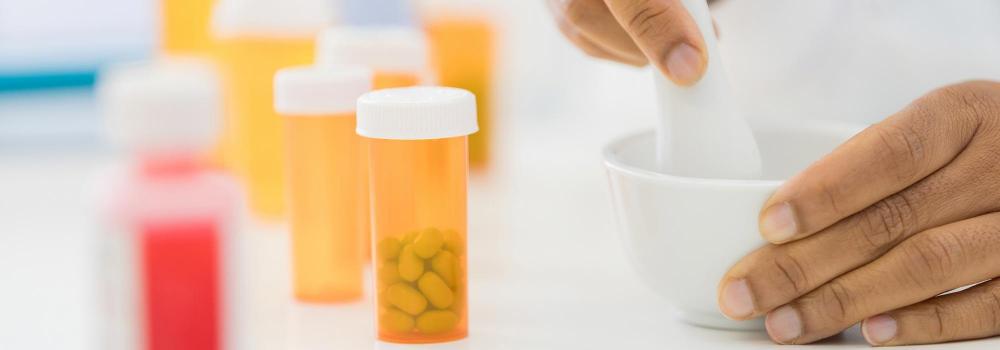You have likely heard doctors or patients referring to a person as being on “a cocktail of drugs,” but what does that actually mean? These combinations of medications are real, but they aren’t just thrown together; the “bartenders” behind these drug cocktails are compounding pharmacists.
Functions of a Compounding Pharmacy
Compounding pharmacies are unique institutions that combine two or more different standard, Food and Drug Administration-certified drugs to create a new medication, or compound. These pharmacies are less common than traditional ones, and while they can be standalone buildings, they often operate out of existing hospitals and pharmacies. Compounding pharmacists receive the same education and training as traditional pharmacists, but can also take additional, optional specialty courses on compounding medications for an added level of professional certification.
Compounding pharmacies provide solutions for patients who:
- Are allergic to an ingredient in a medication that would otherwise treat their illness
- Cannot swallow pills and need adjustments to their medications
- Take several drugs at once and would like the administration process streamlined
Compounded drugs most commonly take the form of creams or liquids rather than a traditional pill format.
Proper Safety Measures Are Vital for Compounding Pharmacies
The pharmacy labs and premises are subject to FDA health standards and guidelines, but the drugs they produce cannot be regulated because each one is an entirely new compound. Instead, their regulation is up to individual state pharmacy boards and to the pharmacies themselves. For this reason, it is incredibly important that pharmacies take appropriate measures to ensure the safety of their products at all times, from sterilizing instruments to storing the compounds in every stage of creation.
A New England compounding pharmacy discovered just how much can go wrong if storage methods fail after patients were accidentally administered contaminated steroid injections. The recipients experienced an outbreak of infections, including many cases of fungal meningitis. Though the Centers for Disease Control and Prevention did not find a root cause for the contamination of the injections, logic would dictate that improper sterilization or storage monitoring might be to blame. In conditions that are too warm or contain too much humidity, organisms like bacteria or fungi can prosper. Unchecked, these organisms contaminate sterile environments such as hospitals and cause major problems, like fungal infections.
How to Prevent Similar Accidents
The best way to counteract disease is to stop it before it happens. Common practices like washing hands thoroughly and regularly disinfecting surfaces are important first steps, but they cannot be the only steps. To prevent instances like the New England meningitis outbreak, and to ensure a safe pharmacy environment post-COVID-19, refrigerators and freezers should be monitored and equipped with a system that immediately detects aberrations in temperature to ensure optimal conditions for medication safety. With products from the Primex OneVue Sense™ portfolio like the OneVue Sense Temperature Sensors, pharmacies are able to actively and remotely monitor their storage conditions. If unit temperature rise above or falls below a customized range, pharmacists can be immediately notified — anytime, anywhere — so the issue can be quickly resolved.
When connected to the web-based OneVue® software, OneVue temperature sensors can make manual logging of storage unit temperatures obsolete, and reassure that medicines are being stored safely even when the office is closed. The Primex OneVue portfolio also includes sensors to observe room temperatures and humidity levels, which is important when considering both the safety and comfort of staff as well as the time the drugs spend outside of storage while being created or delivered. These sensors are able to detect subtle changes in the atmosphere of a room and alert the appropriate people to take corrective action.
In addition to temperature and humidity monitoring products, Primex offers OneVue Sense Differential Pressure Sensors, which track both positive and negative pressure environments to detect changes in air pressure between rooms. This is essential in places like pharmaceutical labs to help stop airborne contaminants in their tracks, eliminating the risk of illness traveling from patient to lab — outside germs stay out, and important areas remain sterile.
After a compound drug is made, patients and pharmacists share a key priority: on-time delivery. Whether that refers to appointments for pickup or the administration of the medication, Primex OneVue Sync™ can help pharmacies be sure that they are prompt, efficient, and running on a standardized schedule; no time should be wasted deliberating over out-of-sync clocks or worrying about inconsistencies between personal timepieces and the building system. OneVue Sync can also pair with other devices to send messages across buildings when there is an emergency.
From keeping storage conditions consistent to providing a synchronous environment, it is clear that dependable monitoring and timeliness are crucial in the process of regulating compounding pharmacies and their products — for this, Primex OneVue can help.
